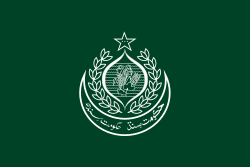| Minister of Education and Literacy of Sindh | |
|---|---|
 Emblem of Government of Sindh | |
 Flag of Government of Sindh | |
| Department of Education and Literacy | |
| Reports to | Chief Minister of Sindh |
| Residence | Karachi |
| Seat | Sindh |
| Appointer | Chief Minister of Sindh with Provincial Assembly of Sindh advice and consent |
| Term length | 5 years |
| Website | Official Website |
The Education and Literacy Department is a key division of the Government of Sindh, Pakistan, responsible for overseeing the provincial's education system. Its primary role is to manage educational affairs within Sindh and coordinate with the Federal Government and donor agencies to promote education. The department supervises primary education while managing secondary education, technical education, incentive programs, and various development initiatives. [2]
Contents
- Facts
- Autonomous Bodies
- Reform Support Unit
- Sindh Textbook Board
- Bureau of Curriculum
- Sindh Education Foundation
- Provincial institute of Teacher Education
- Sindh Teachers Education Development Authority
- Sindh Basic Education Program
- See also
- References
- External links
On 6 October 2016, the Government of Sindh reorganised the Education and Literacy Department into two distinct entities: the College Education Department and the School Education Department, each led by its own Secretary. [3]